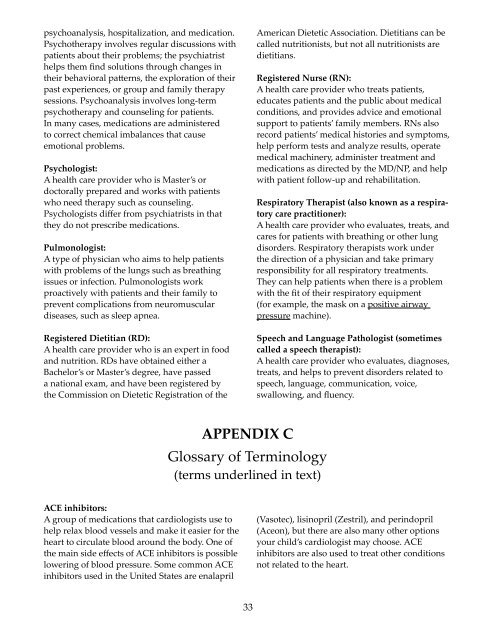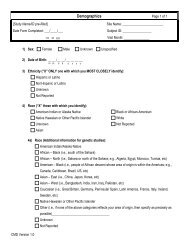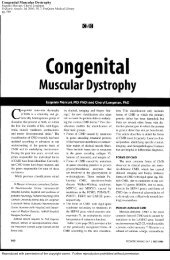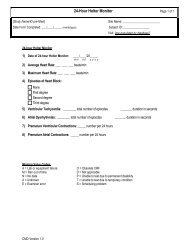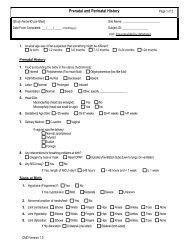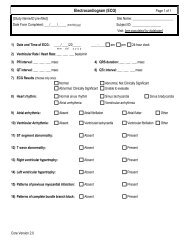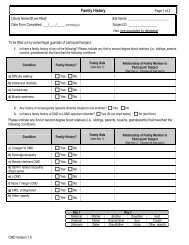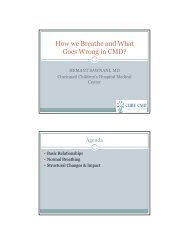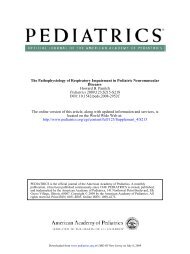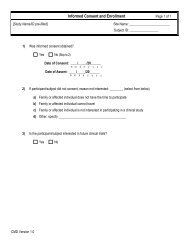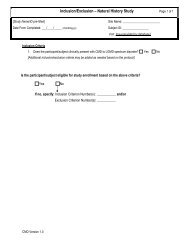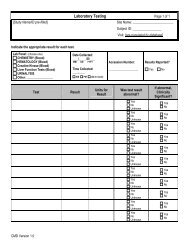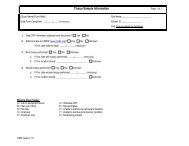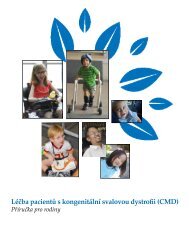The Management of Congenital Muscular Dystrophy ... - Cure CMD
The Management of Congenital Muscular Dystrophy ... - Cure CMD
The Management of Congenital Muscular Dystrophy ... - Cure CMD
You also want an ePaper? Increase the reach of your titles
YUMPU automatically turns print PDFs into web optimized ePapers that Google loves.
psychoanalysis, hospitalization, and medication.Psychotherapy involves regular discussions withpatients about their problems; the psychiatristhelps them find solutions through changes intheir behavioral patterns, the exploration <strong>of</strong> theirpast experiences, or group and family therapysessions. Psychoanalysis involves long-termpsychotherapy and counseling for patients.In many cases, medications are administeredto correct chemical imbalances that causeemotional problems.Psychologist:A health care provider who is Master’s ordoctorally prepared and works with patientswho need therapy such as counseling.Psychologists differ from psychiatrists in thatthey do not prescribe medications.Pulmonologist:A type <strong>of</strong> physician who aims to help patientswith problems <strong>of</strong> the lungs such as breathingissues or infection. Pulmonologists workproactively with patients and their family toprevent complications from neuromusculardiseases, such as sleep apnea.Registered Dietitian (RD):A health care provider who is an expert in foodand nutrition. RDs have obtained either aBachelor’s or Master’s degree, have passeda national exam, and have been registered bythe Commission on Dietetic Registration <strong>of</strong> theAmerican Dietetic Association. Dietitians can becalled nutritionists, but not all nutritionists aredietitians.Registered Nurse (RN):A health care provider who treats patients,educates patients and the public about medicalconditions, and provides advice and emotionalsupport to patients’ family members. RNs alsorecord patients’ medical histories and symptoms,help perform tests and analyze results, operatemedical machinery, administer treatment andmedications as directed by the MD/NP, and helpwith patient follow-up and rehabilitation.Respiratory <strong>The</strong>rapist (also known as a respiratorycare practitioner):A health care provider who evaluates, treats, andcares for patients with breathing or other lungdisorders. Respiratory therapists work underthe direction <strong>of</strong> a physician and take primaryresponsibility for all respiratory treatments.<strong>The</strong>y can help patients when there is a problemwith the fit <strong>of</strong> their respiratory equipment(for example, the mask on a positive airwaypressure machine).Speech and Language Pathologist (sometimescalled a speech therapist):A health care provider who evaluates, diagnoses,treats, and helps to prevent disorders related tospeech, language, communication, voice,swallowing, and fluency.APPENDIX CGlossary <strong>of</strong> Terminology(terms underlined in text)ACE inhibitors:A group <strong>of</strong> medications that cardiologists use tohelp relax blood vessels and make it easier for theheart to circulate blood around the body. One <strong>of</strong>the main side effects <strong>of</strong> ACE inhibitors is possiblelowering <strong>of</strong> blood pressure. Some common ACEinhibitors used in the United States are enalapril(Vasotec), lisinopril (Zestril), and perindopril(Aceon), but there are also many other optionsyour child’s cardiologist may choose. ACEinhibitors are also used to treat other conditionsnot related to the heart.33


